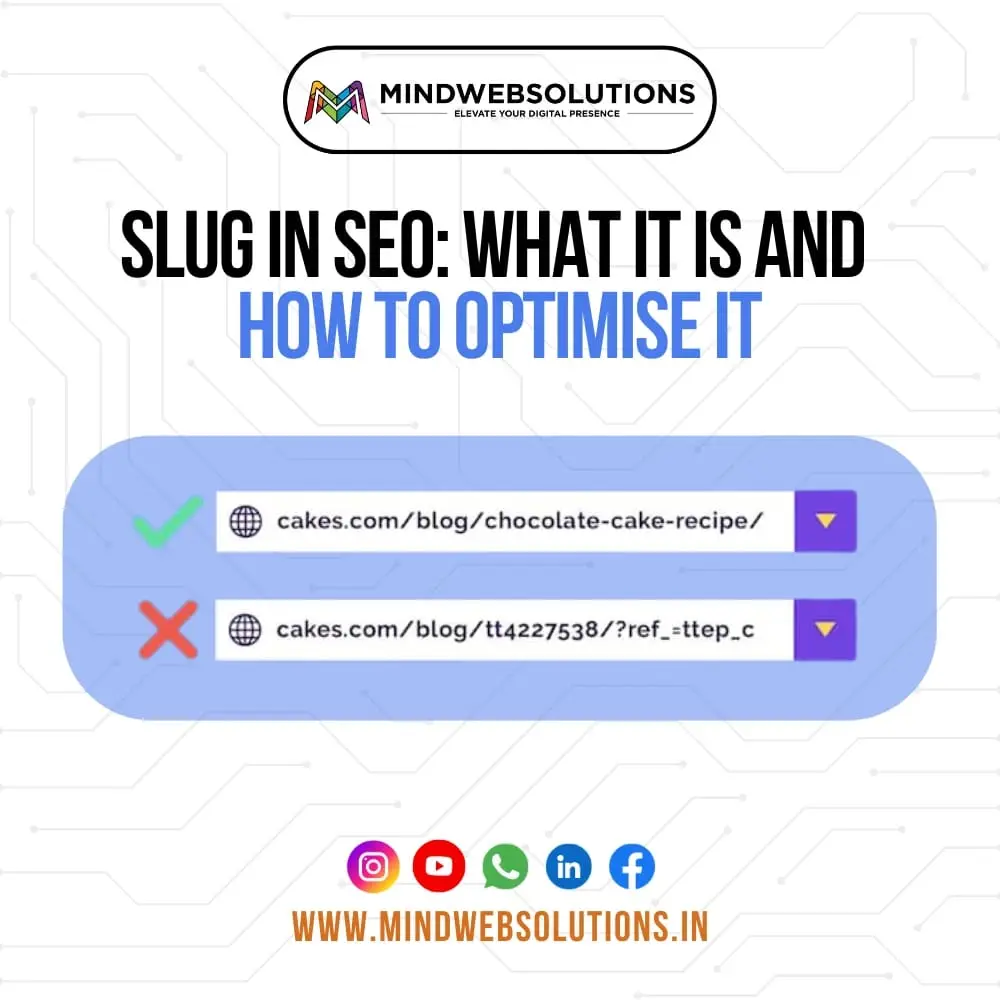What Is Slug In SEO?
A slug in SEO is the end part of the URL that serves as an address for the website page. In simple words, a slug SEO explains the webpage content.
The slug is usually followed by the domain name and backlash. It includes a few words separated by a hyphen.
Creating the right slugs SEO is important. You may wonder why.
A slug is the part of a URL that comes after the domain name and pinpoints a specific page on your website. Let’s take our website, for seo slug examples.
Here, in the URL of our website, “https://mindwebsolutions.in/contact-us/”, the slug is contact-us.
It’s a tiny detail, but it can impact on your SEO performance positively when infused correctly.
Here’s Why.
Search engines prefer to rely on slugs to understand the relevance of your page content. If the slug of the URL is clean and short, search engines are happy in the sense that they crawl and index your content faster.
Besides, the slug also makes it easier for your target audience to find you. They don’t have to dig in read it all. The users can thus, get a quick idea of what your page offers through slugs, much before they click. This way, it makes navigation easy and swift.
And if the audience likes your content, it builds brand trust and engagement. This also increases social sharing as the URL slug is not 2 to 3 lines lengthy. A good slug is concise, easy to read and understand and can be shared.
And all this is not just guesswork. Statistics show that pages with optimized URLs have higher click-through rates (CTR) by up to 45%.
Fun fact time: The word “slug” originates from journalism, where it referred to short titles used to describe an article before its official headline was decided. In the digital world, it carries the same principle: a concise summary that’s both informative and functional.

How Is A Slug Different From A Headline?
Now, you might be wondering, “If I already have a killer headline, do I really need to worry about the slug?” Absolutely.
While your headline is there to grab attention, the slug serves a different purpose.
When we talk about slugs, it is there to directly affect SEO rankings and increase visibility. Headlines are designed to be catchy and engaging as they impact user engagement metrics and bounce rates.
For example:
- Headline: “How To Reduce Spam Score Of Website & Get Rid Of It Completely”
- Slug: “how-to-reduce-spam-score”
Now you see the difference? The headline hooks the reader, while the slug describes, in brief about, the website content to you at a glance.
How To Optimise A Slug For SEO Success?
Let me break the myth ice for you. Optimising slug for SEO to impress search engines might sound tough. But it isn’t rocket science.
However, there are a few best practices that can make a world of difference:
- Keep It Short and Simple
Always make sure to keep the SEO slug length short and straightforward. Aim for 3-5 words. Longer slugs can confuse the users to understand the content on-page.
A slug-like “what-is-slug-seo” is better than this unoptimized slug – “all-about-how-to-make-your-slug-better-in-seo.” You can clearly see the former is concise and conveys to the reader what to expect. At the same time, it is SEO-friendly too.
Besides, search engines like Google usually truncate snippets on the result page. This impacts the readability and visibility of your webpage.
- Avoid Using Stop Words
Stop words like “of”, “do”, “and” “the”, etc are known as stop words. Usually, these include prepositions like “on”, “under”, “in”, etc, and articles like “a”, “an”, and “the”.
Stop words don’t add value, and search engines like Google do not consider them for ranking purposes. So, they should be omitted from slugs.
- Incorporate Target Keywords
Your primary keyword should appear in the SEO slug. For instance, if your main keyword is “What is slug in Yoast SEO,” your slug should mention it. Keywords are important for CTR metrics and site authority.
- Use Hyphen as Separators
Always separate words with hyphens, like this: yourdomain.com/seo-tips. Avoid underscores, colons or spaces.
- Do Not add Special Characters
Special characters like @, #, $, &, * etc are confusing for the search engines. Search engines encode them as percentage symbols. As a result, they cause glitches and create broken URL links. Hence, one must avoid using them at all costs.
- Use Lowercase Letters Only
Type slug in lowercase to avoid duplication of content by search engines. Also, if we go by the logic, more than 90% of users type in lowercase for any query on the search bar.
- Keep Updating Your Slugs
Slugs with dates, events or other elements can become outdated soon. For instance, adding the year 2024 in the slug may go outdated in 2025, which is about to roll in a few months.
Hence, it is important to regularly update them. Make sure to redirect your old slug URLs to new ones to prevent 404 errors and preserve its link juice.
What Is The Best Length For An SEO Slug?
There’s no magic number for slug length seo. But keeping your SEO slug length between 50-60 characters is considered best practice.
Anything longer will get chopped off in search engine results, leaving an incomplete message to your users. Shorter slugs are easy to read and rank better. However, the slug length also depends on your page content and may differ from this range.

Why It Is Important To Optimize URL Slug?
If you read till here, you know how optimized SEO slug is important for high ranking on search engines. But it’s not just about search engines.
Users are also more likely to click on a URL that is short yet descriptive and optimized with keywords.
45% of searchers are more likely to click on a URL that clearly describes the content. The better your slug, the better your chances of getting that click.
Does Changing A Slug Affect SEO?
Yes, it can if you do it frequently without caution. When you change a slug, the URL of your page changes. If you fail to do a 301 redirect, you could lose all the SEO value that page had built up.
If you must change a slug:
- Always set up a 301 redirect from the old slug to the new one.
- Make sure the new slug is SEO-friendly and follows the best practices outlined earlier.
How To Edit A Slug In WordPress?
Editing a slug in WordPress is simple. Here’s how to do it:
- While editing on WordPress, scroll to the URL Slug section and change the text to your preferred slug.
- Use the Yoast SEO plugin and manually edit the slug in the Slug field.
What Is A URL Permalink, And How Does It Differ From A Slug?
Many confuse the permalink and slug as the same thing. But that is not the case. A permalink is the entire URL of a page, while the slug is just the customizable part.
For example, in the URL www.mindwebsolutions.in/seo-guide, the permalink is the entire link, while the slug is just “seo-guide.”
Frequently Asked Questions About 'Slug In SEO'
Slug SEO is the last part of the URL that identifies the content of the website page. A slug comes after the website’s domain name and is separated by a backlash. For example, “www.yourdomain.com/seo-tips”. Here seo-tips is the slug.
The ideal length of slugs should be between 50-60 characters.







